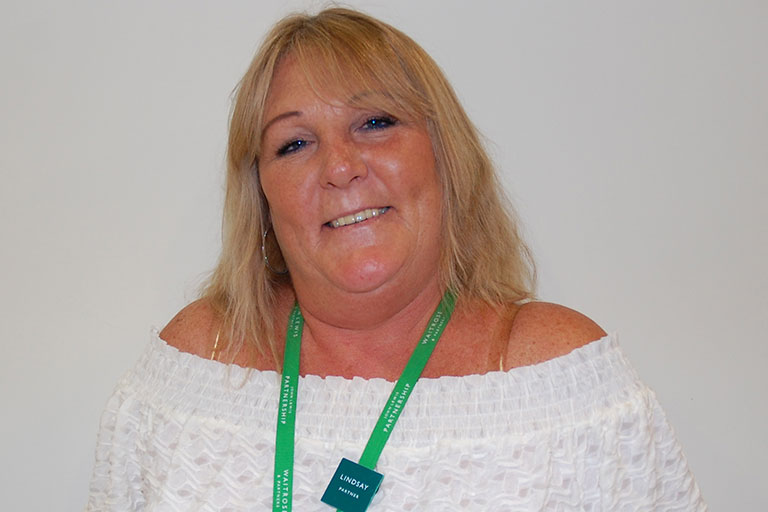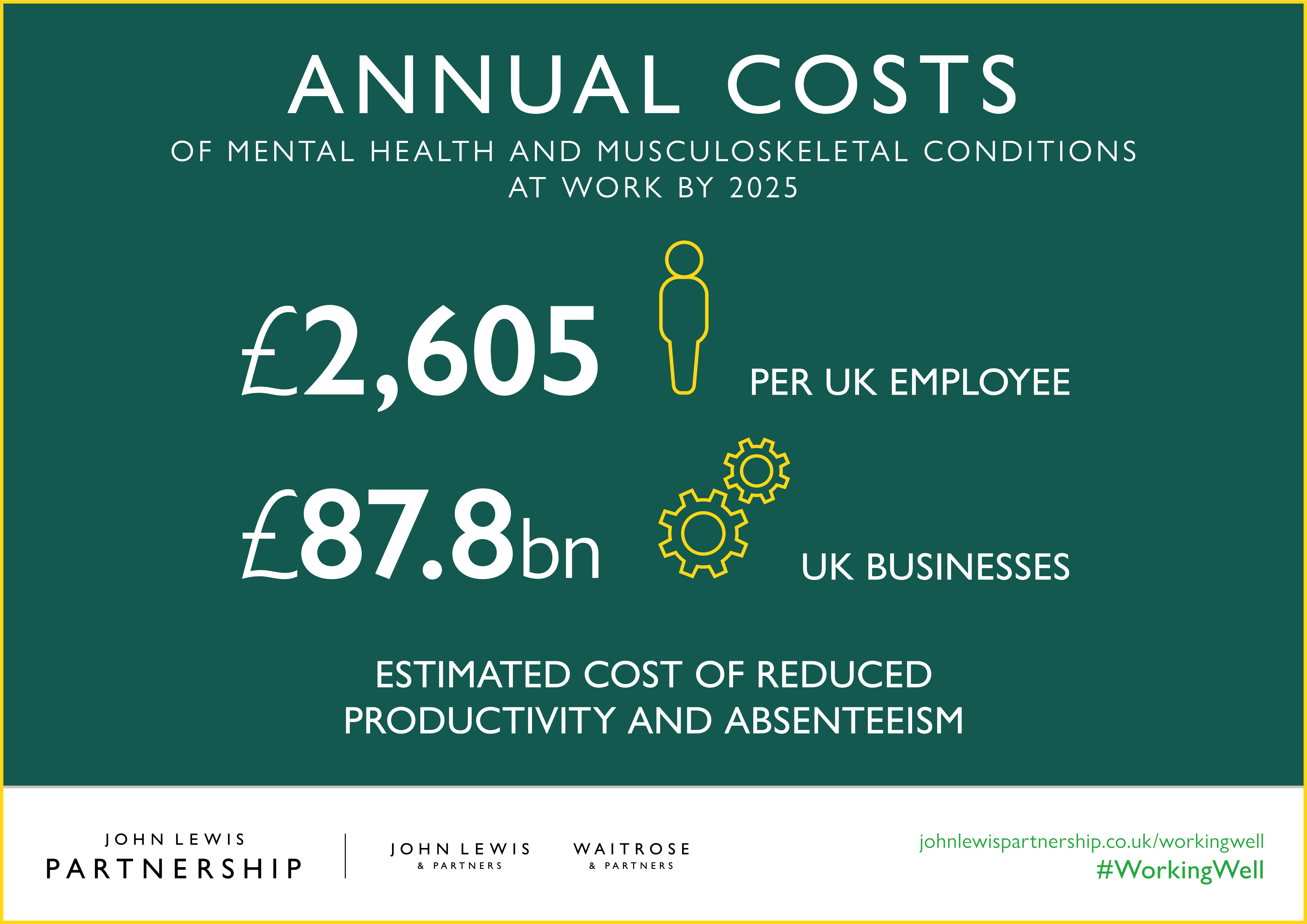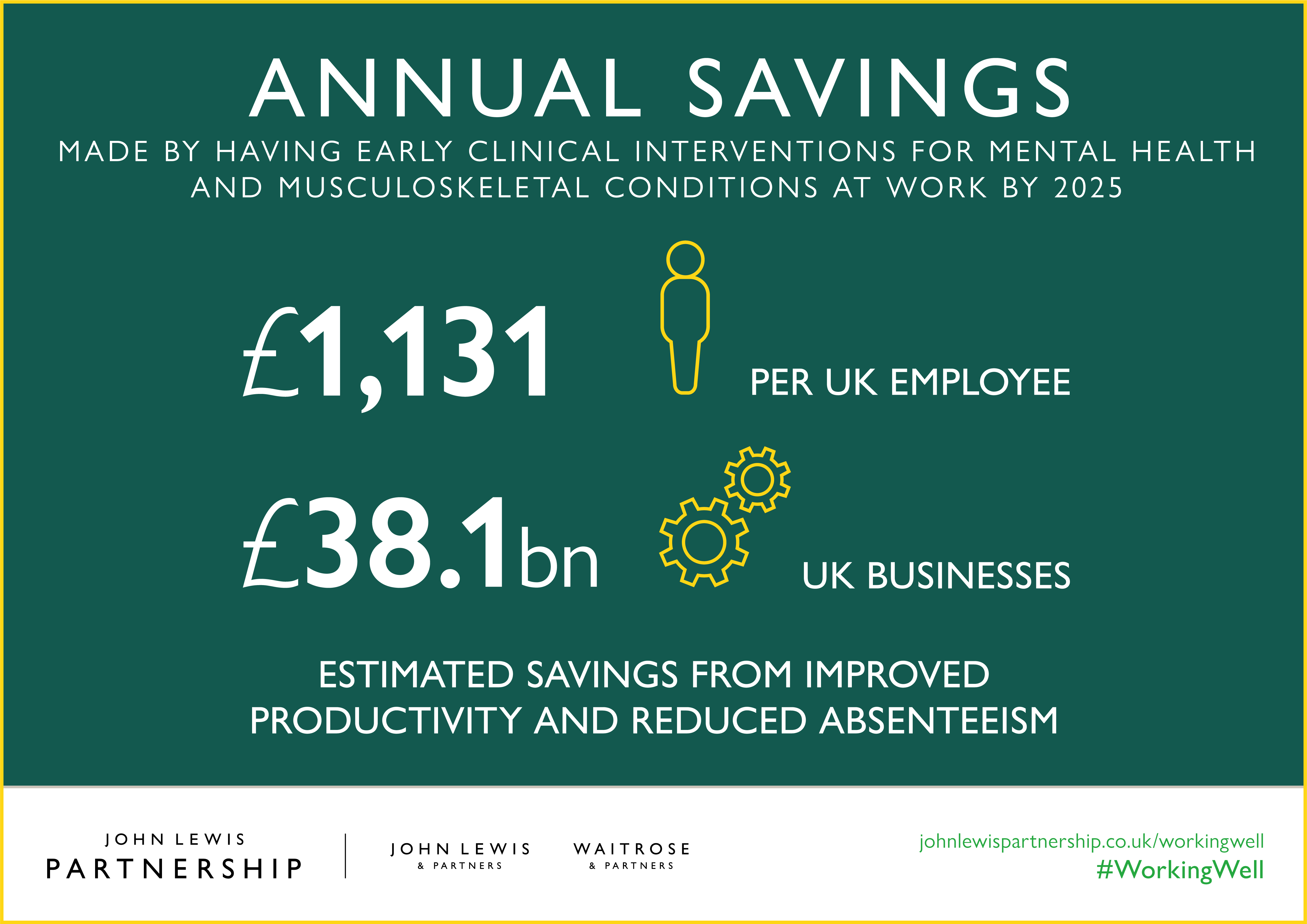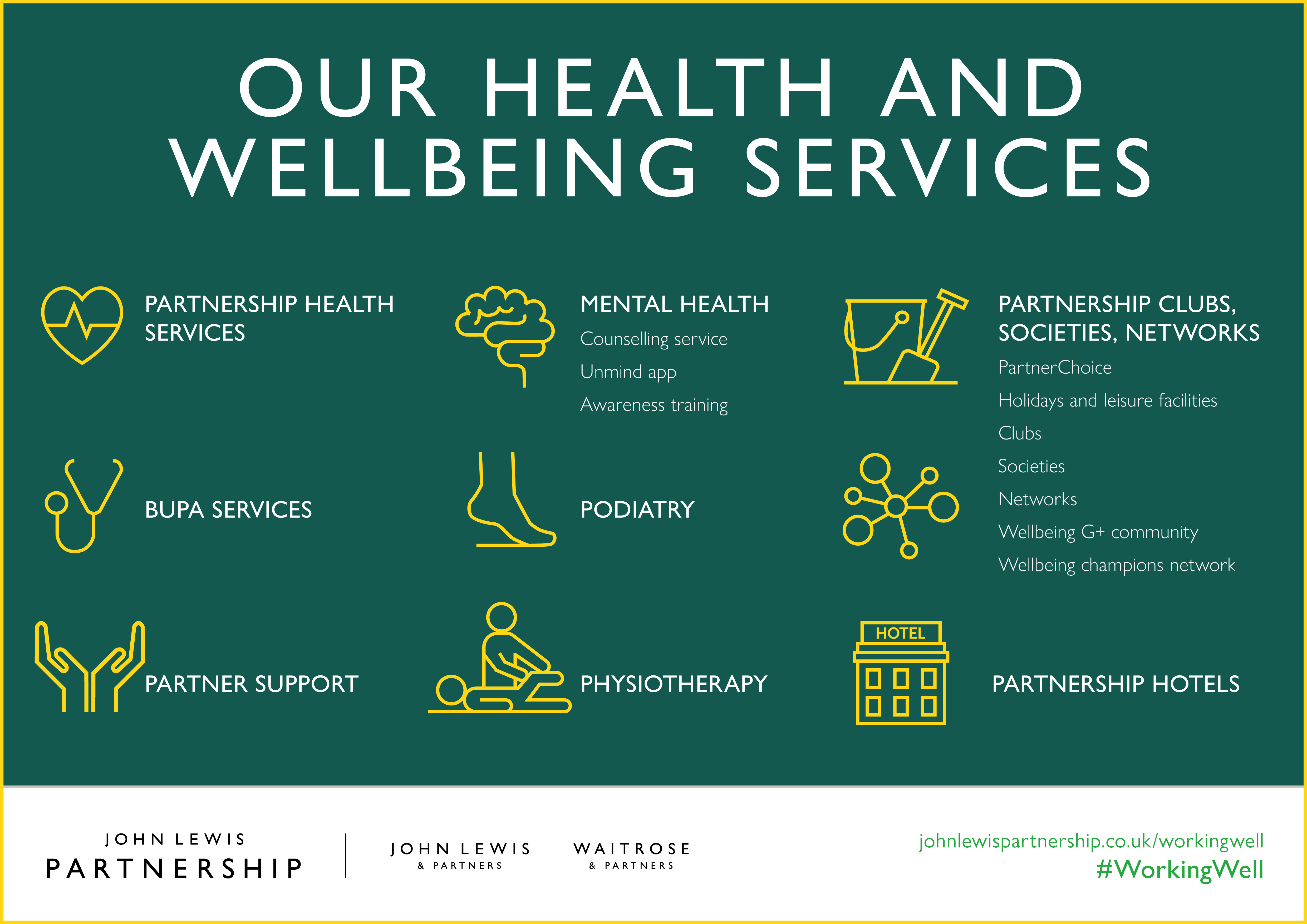The Working Well Campaign
Fulfilling and meaningful work is a source of wellbeing. Having a supportive employer who enhances employee wellbeing and invests in early clinical intervention, can make a real difference to someone grappling with a physical or mental health condition and their recovery. For business, a healthy, engaged workforce can boost performance and productivity.
New research from the John Lewis Partnership and Centre for Economics and Business Research (Cebr) shows the total cost of absenteeism in the UK due to mental health and musculoskeletal conditions is forecast to reach £3.8 billion in 2025. While substantial, this is dwarfed by an estimated £84 billion in reduced productivity by 2025.
By employers, health experts and government working together, we estimate businesses in the UK can save up to £1.7 billion by 2025 from the cost of absenteeism, just through early clinical intervention for musculoskeletal and mental health conditions. The cost of reduced productivity could also fall by £36.4 billion. This report doesn’t hold all the answers but is the start of a conversation on how to do that. We want to see all occupational health services as a non-taxable benefit in kind to incentivise employers to invest in clinical intervention.
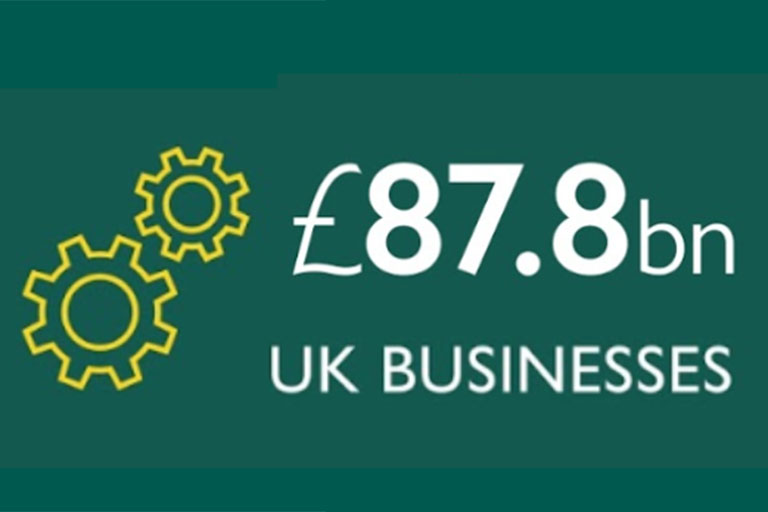
Estimated cost of reduced productivity and absenteeism for UK businesses
for mental health and musculoskeletal conditions
by 2025.

Estimated savings from improved productivity and reduced absenteeism for UK businesses by investing in early clinical interventions at work for musculoskeletal and mental health conditions by 2025.
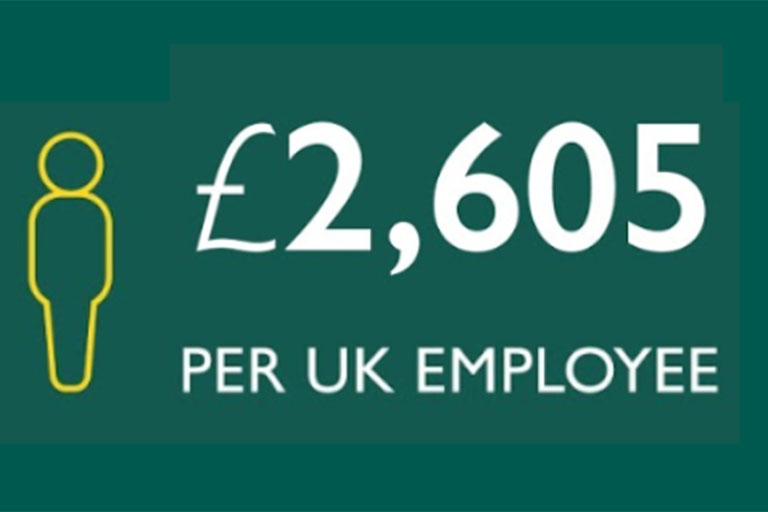
Estimated cost of reduced productivity and absenteeism per UK employee per year for mental health and musculoskeletal conditions
by 2025.
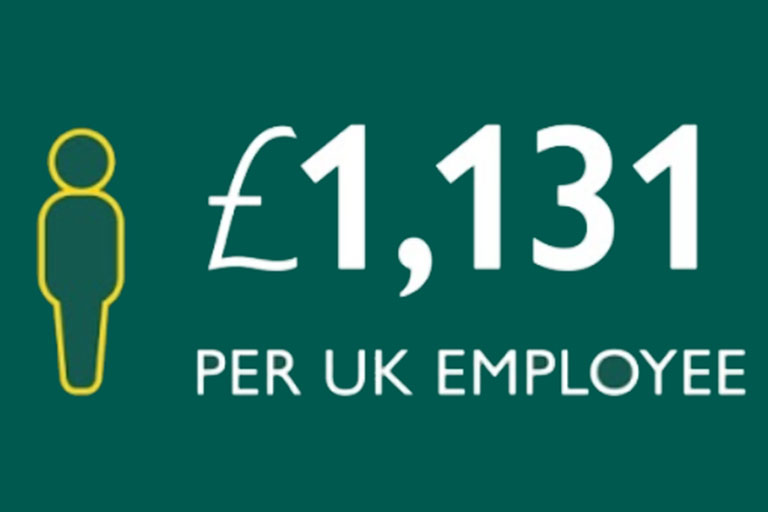
Estimated savings from improved productivity and reduced absenteeism per UK employee per year by investing in early clinical interventions at work for musculoskeletal and mental health conditions by 2025.
HOW EMPLOYER-PROVIDED HEALTH SERVICES ARE TAXED
Currently, employer-provided occupational health services are a taxable benefit and subject to National Insurance and Income Tax. This results in an effective tax rate of more than 40%. There is a limited tax exemption of up to £500 but only for those that have been out of work for more than 28 days or where the health condition is a direct result of their work. We therefore want to see all occupational health services as a non-taxable benefit in kind to incentivise employers to invest in early intervention.
HOW CAN GOVERNMENT HELP?
- Making occupational health services a non-taxable benefit in kind to incentivise employers to invest in early intervention.
- Focusing workplace health policy and legislation on early intervention as well as long-term sickness absence.
HOW CAN EMPLOYERS HELP?
- Intervening early and offering free occupational health services which are high quality and clinically-backed.
- Promoting good management practices and work-life balance to lay the foundations for a healthy workplace.
- Creating an inclusive culture, tackling taboos and removing stigma to allow people to thrive so they can seek help and receive adjustments they need.
- Sharing best practice and evidence and promoting the business case for investing in the health of their people.
Further information is available in our Working Well Report.
Download our infographics
Annual Costs
of mental health and musculoskeletal conditions at work by 2025
Annual Savings
made by having early clinical interventions for mental and musculoskeletal conditions at work by 2025
services
Our health and wellbeing services
PARTNER STORIES
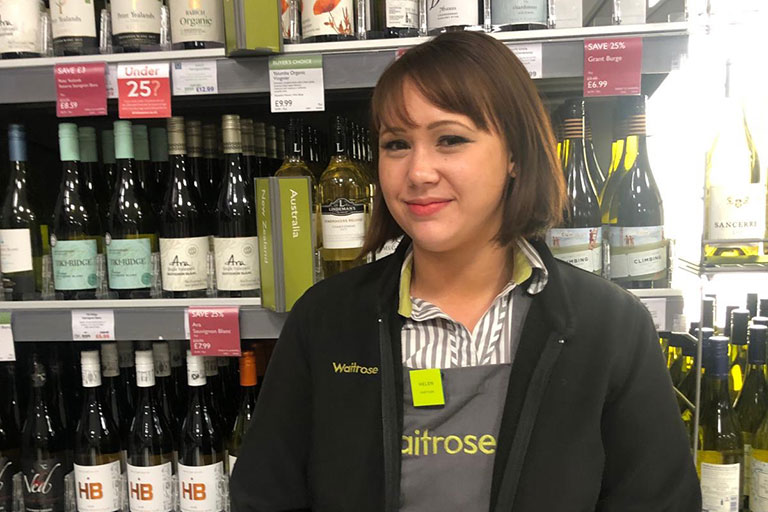
HELEN
Supermarket Assistant at Waitrose & Partners
“I’ve had rheumatoid arthritis since I was 18. When I was applying for a job at the Partnership I noted this in my application so the company was aware of my health condition before I joined. Everyone has been very supportive from day one.
“Last year, my hip got worse and I needed some time off work. I was concerned and didn’t know who to ask for help. That’s when my team manager suggested I speak to the Partnership’s occupational health services and Partner Support. The support I’ve received has been brilliant. I had a hip replacement in October and have had no trouble getting time off and they arranged a phased return to work, which was really helpful. I was even offered the opportunity to change roles if I wish.
“I was really worried that I would be a burden to everyone at work, but through conversations with Partner Support and my line manager I felt supported and reassured that I’m not a burden and that I’m valuable to the Partnership.”
Matt
Section Manager at John Lewis & Partners
“I may come across as a confident person at work, but I have suffered with anxiety periodically for years since my father passed away. I hid it, because I thought people would judge me, that ‘real men’ don’t ask for help and that I was tough enough to ride it out.
“Recently, it had been overwhelming me and came to a tipping point when one morning I couldn’t get up and had to call in sick. When I came back to work I told my manager the truth and called Partner Support to get help. They told me about our psychology support services and I now have regular counselling sessions and already feel better and more in control of my emotions. There was no waiting time and I was able to get help immediately and remain at work.
“I bottled things up for so long and it's such a relief to be open about it. I’ve been amazed by the support and encouragement I’ve received from other Partners. We all need a little extra support from time to time, I'm so glad I finally asked for it.”

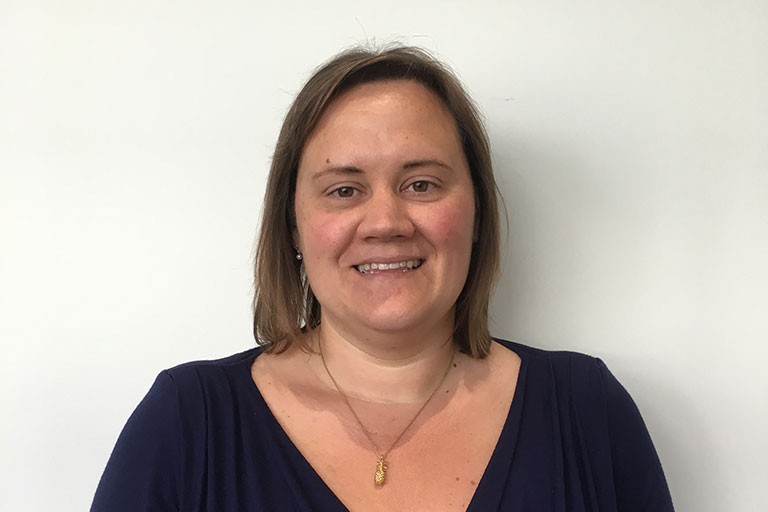
Natalie
Assistant Marketing Manager for customer loyalty at Waitrose & Partners
“Around 18 months ago after working for the Partnership for 17 years, I applied for a secondment within the Partnership, following coaching and mentoring support. I was excited to try something new and coaching and mentoring provided the boost of confidence I needed to apply, but with the new role, working full-time, looking after two children and some things happening outside of work, I had lots going on and started struggling with anxiety.
“I saw an article in the Gazette on mental health and the support we had available in the Partnership and called our health services. They arranged counselling sessions with an external provider, which I found very helpful. I could talk through things that were confidential and private and the therapist suggested tools and techniques I could use. It was all free and I think that’s important, because when you’re struggling with a mental health issue, the worry about how you’re going to pay for all of this just adds to the anxiety.
“I also got help from my GP, but having the combination of support has been really invaluable. I’m glad I’ve done the personal development as otherwise I wouldn’t be in the position I’m now and the whole thing has really helped with my confidence. My secondment has led to a new permanent role and I feel like if I ever need support again I know where to go and get help if I need it.”
Lindsay
Personnel Advisor for the John Lewis Partnership.
Following multiple challenges in her personal life, Lindsay’s health reached a point where she could not leave the house. In urgent need of help, she turned to her line manager, who referred her to Partnership Health Services.
“Partnership Health Services met with me to work out what support I needed. They paid for face-to-face counselling and put me in touch with our Partner Support team. Being able to talk openly about how I was feeling meant that I was able to be back at work after 3 months off. Partner Support still keep in touch with me and I know they are there if I need them again. I feel like a new person and my colleagues are noticing the big difference in how I am feeling.”
Lindsay is now about to progress her career into a new role within the Partnership. She is talking openly about her experience so that nobody feels like they have to tackle ill health on their own.
